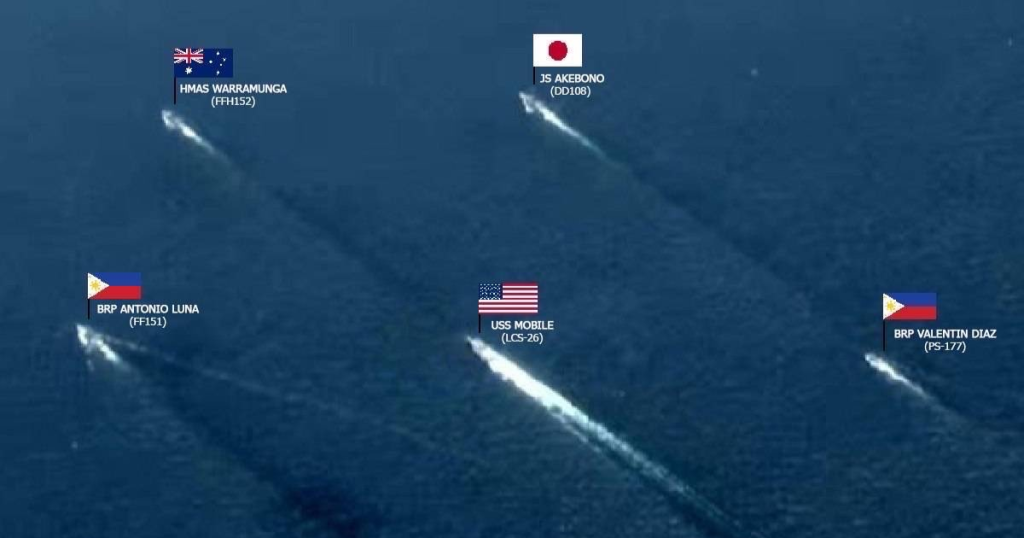The Inevitability of Armed Conflict in the South China Sea

As part of a shared commitment to rules-based order in maritime conduct in the disputed waters, two Philippine vessels are joined by ships from Australian, US and Japan during the Maritime Cooperative Activity in the West Philippine Sea last April 11, 2024.
By Col Dencio S Acop (Ret), PhD | Date 04-13-2024
BOSTON, MASSACHUSETTS —By all indicators, there will be an armed conflict in the South China Sea. Armed confrontation is inevitable for the following reasons. One, war is already happening. Two, the course taken by the antagonist is irreversible. And three, each side is committed to its survival tangibly and intangibly.
In the first argument, contending forces in the South China Sea have already been at war. Actions taken by China in what is known as gray zone operations or acts below the threshold of war may not constitute ‘war’ as defined by the Western world.
But it is war just the same. It’s just a play of semantics. Realities on the ground have long betrayed this long play with words.
Empirical evidence speaks the loudest. Today, as we write, China is relentlessly pouring down all kinds of offensive action against the Philippines right in its backyard.
If that is not ‘war’ in the raw sense of the word, I do not know what is. China has been doing it for years now. It may deflect its culpability, claiming past Philippine leaders ‘authorized’ its territory-grabbing. However, such does not resolve the fundamental issue of violating another nation’s sovereignty.
It only reveals the treasonous culpability of past Philippine leaders and invites repulsive action by all nations that value mutual respect and the rule of law.
The violative actions of China against the Philippines are also a declaration of indirect war against other claimants to disputed islets in the South China Sea. They are also sending warning messages to Vietnam, Brunei, Taiwan, and Malaysia.
Especially Taiwan, which China is bent on ‘recovering’ being what it claims is its ‘renegade province’ despite Taiwan’s being globally recognized as a sovereign state.
China’s ‘interception’ of foreign flights and sea voyages accessing international air spaces and sea lanes over the South China Sea ‘wars’ against global freedom of navigation enforceable through international law.
Its expedited nuclear arms race, BRI-facilitated ‘Silk Road’ through authoritarian regimes across Asia and Africa, rapid PLA modernization and expansion of aircraft carriers, and ‘in-your-face’ acquisition of foreign territory and natural resources are all indirect and ongoing declarations of war against the global order and all its adherents.
Military alliances are instruments of war. On the one hand, China counts on its alliances with Russia, North Korea, and Iran – all authoritarian and nuclear states. And on the other hand, the Philippines relies upon its alliances with the United States, Japan, Australia, India, and the European Union, among others.
Second, the course of action taken by China seems irreversible. China is a very deliberate nation. When it embarks on something, that decision has been thought through for some time – its costs and benefits carefully analyzed. However, one thing must be remembered regarding China – its proud adherence to its historical legacy and tradition. This is its national strength. But it is likewise China’s inherent weakness. China is not a democracy. So, its national choices have not always been those of the people’s will. China is an authoritarian state ruled by the 90 million-strong Chinese Communist Party.
The Chinese may be more than a billion-strong in terms of its population, but the CCP determines the fate of these numbers of Chinese men and women. Now, for all its avowed Marxist-Maoist leanings, China is paradoxically not an egalitarian society. Therefore, while the party leadership may pronounce that it works for the overall good of the people, its adopted policy decisions are what preserves the Party first and foremost. And the Chinese population second. As in most histories of once domestically weak turned powerful enclaves, the good of the people does not always coincide with the decision of its leaders.
For instance, while the leadership may justify that the invasion of another country will eventually benefit its people by capturing essential natural resources, the people must sacrifice as a result of that decision. Historically, this was what happened with Japan when its first autocratic shogun decided to invade Korea and China in the 16th century.
The leaders of China today believe that their national power has put them in a position where they feel they have nowhere to go but out in the world. That it is their destiny. They are now embarked on realizing this grand strategy. China is now in the final stage of this grand strategy to assert itself in the world, challenging the global order and, inevitably, the United States being the global leader. Chinese sunk costs are everywhere today: the BRI, the AIIB, the occupation of disputed islets in the South China Sea, support of Iran-backed Hamas against Israel, support of Russia against Ukraine, and its nuclear and military buildup.
China also believes that unprecedented technological advancements like AI, the implosion of ‘decadent’ liberal order adherents led by the US, and the urgent need of its ‘starving’ domestic population for food and other resources found only abroad spell windows of opportunity that must be exploited before they pass.
Third, each side in the impending armed conflict in the South China Sea is committed to its survival, tangibly and intangibly. While every protagonist has national interests to protect, what lies at the core center of these interests, which is expected of all involved nations setting them apart from the other side is their most cherished value.
On the one hand, the liberal order was led by the United States. On the other hand, the authoritarian order is now jointly led by Russia and China. The Philippines allies with the US. It has been a former US colony for half a century and has an ongoing defense treaty with its former master, obliging the US to come to its aid if attacked by another country. It is argued that what lies at the core of what sets countries on a collision course eventually is their politico-religious belief system. It is further argued that its economic and other social values flow from the former.
It can even be added that a country’s politico-religious belief system pre-determines a country’s national development. The communist USSR collapsed in the 1990s and the US hoped it would eventually join the ranks of democracies. The US assisted China since Nixon and brought it back on its feet, hoping it would one day join the ranks of the liberal order. The US tried its best to convert its adversaries, hoping that by turning democratic, these rivals would cease to be its antagonists as ‘democracies don’t go to war against each other’.
The US was proven wrong by Russia and China. For more than twenty years, Vladimir Putin has run circles around the world to remain in power and reassert Russia back on the world map.
Under his leadership, Russia annexed Crimea and attacked Ukraine. If Putin had his way all the way, he would reassert the ‘USSR’ to its former glory days to showcase the historical legacy of his unique ‘Euro-Asian empire’ distinct from the American liberal order. After Tiananmen Square, the Chinese Communist Party saw the US as a threat because it was drawing its ‘most favored trading partner’ into the global liberal order.
As it turns out, the CCP would have none of it, and it evolved into a party that drew out the likes of Xi Jinping, who could lead China into the 21st century – to become a global leader but not a copycat of the United States.
Consistent with the teachings of Sun Tzu and lacking adherence to the moral code, China sees false narratives and deceiving the enemy as just the ‘art of war’ proven effective by Machiavelli. But, politico-religious belief systems are the most powerful human core values. To marginalize them is like saying that the three monotheistic religions in Jerusalem would simply dissolve one into the other.
Tags: Security
